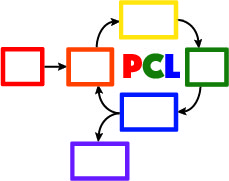The POGIL-PCL Group:
Where did we come from?
The POGIL-PCL community is an off-shoot of The POGIL Project. We were initially given a small SPUR grant in 2008 to bring four members together to begin development of a series of experiments for the undergraduate physical chemistry teaching laboratory. The initial group, Sally Hunnicutt, Renée Cole, Alex Grushow, and Rob Whitnell met over a cold weekend in January of 2009 at Virginia Commonwealth University in Richmond, VA. From these early beginnings we developed a community of educators who were interested in using the POGIL methodology to create inquiry-based experiments that asked students to think about how to do an experiment, what data they should acquire, how it should be modeled, and what the results mean.
How did we get here?
After that first workshop, the POGIL-PCL group obtained two rounds of NSF funding. The first grant was to develop materials, but also to learn how to provide workshop experiences that engaged the faculty participants long after the workshop was over so as to ensure that these faculty would actually use and adopt materials developed by the group. The second grant has also allowed us to continue developing experiments for the physical chemistry teaching laboratory. However, we are now also researching how students behave and what they actually learn when performing a POGIL-PCL experiment. We are also using social network analysis to understand how our community of well over a hundred educators continues to thrive and connect with one another both through the POGIL-PCL workshops and through other common interests.
Who we are and what we do
The POGIL-PCL project held our first development and implementation workshop at Virginia Commonwealth University in January 2012. Since then, we have held a dozen multi-day workshops for 15-25 faculty at VCU, UT Austin, University of Pittsburgh, and Cal Poly Pomona. We have presented half-day introductory POGIL-PCL workshops at every BCCE since 2012, and we introduced online workshops to our portfolio in 2017, facilitating at least two each year. The project team and many of the participants have presented POGIL-PCL work at American Chemical Society national and regional meetings, Gordon Research Conferences, and other meetings, including organizing a symposium on physical chemistry lab at the 2015 Denver ACS meeting. The project community currently numbers over 150 faculty, postdocs, graduate students, and others interested in improving what happens in the physical chemistry lab experience. About half of the faculty participants have at least 10 years experience, and 30% are within their first four years of teaching. They represent public and private institutions, small, medium, and large. Our current NSF grant supports workshops through 2021, the social network analysis research of the POGIL-PCL community, and the research on student learning in the physical chemistry laboratory.
